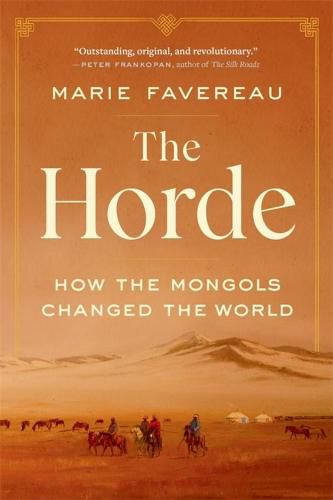Readings Newsletter
Become a Readings Member to make your shopping experience even easier.
Sign in or sign up for free!
You’re not far away from qualifying for FREE standard shipping within Australia
You’ve qualified for FREE standard shipping within Australia
The cart is loading…






Cundill Prize Finalist A Financial Times Book of the Year A Spectator Book of the Year A Five Books Book of the Year
Outstanding, original, and revolutionary. Favereau subjects the Mongols to a much-needed re-evaluation, showing how they were able not only to conquer but to control a vast empire. A remarkable book.
-Peter Frankopan, author of The Silk Roads
The Mongols have been ill-served by history, the victims of an unfortunate mixture of prejudice and perplexity The Horde flourished, in Favereau’s fresh, persuasive telling, precisely because it was not the one-trick homicidal rabble of legend.
-Wall Street Journal
Fascinating The Mongols were a sophisticated people with an impressive talent for government and a sensitive relationship with the natural world An impressively researched and intelligently reasoned book.
-Gerard DeGroot, The Times
The Mongols are widely known for one thing: conquest. But in this first comprehensive history of the Horde, the western portion of the Mongol Empire that arose after the death of Chinggis Khan, Marie Favereau takes us inside one of the most powerful engines of economic integration in world history to show that their accomplishments extended far beyond the battlefield. The Horde was the central node in the extraordinary commercial boom of the thirteenth and fourteenth centuries that brought distant civilizations in contact for the first time. Its unique political regime-a complex power-sharing arrangement between the khan and nobility-rewarded skillful administrators and fostered an economic order that was mobile, organized, and innovative. From their capital at Sarai on the lower Volga River, the Mongols provided a governance model for Russia, influenced social practice and state structure across the Islamic world, disseminated sophisticated theories about the natural world, and introduced novel ideas of religious tolerance.
An eloquent, ambitious, and definitive portrait of an empire that has long been too little understood, The Horde challenges our assumptions that nomads are peripheral to history and makes it clear that we live in a world shaped by Mongols.
$9.00 standard shipping within Australia
FREE standard shipping within Australia for orders over $100.00
Express & International shipping calculated at checkout
Cundill Prize Finalist A Financial Times Book of the Year A Spectator Book of the Year A Five Books Book of the Year
Outstanding, original, and revolutionary. Favereau subjects the Mongols to a much-needed re-evaluation, showing how they were able not only to conquer but to control a vast empire. A remarkable book.
-Peter Frankopan, author of The Silk Roads
The Mongols have been ill-served by history, the victims of an unfortunate mixture of prejudice and perplexity The Horde flourished, in Favereau’s fresh, persuasive telling, precisely because it was not the one-trick homicidal rabble of legend.
-Wall Street Journal
Fascinating The Mongols were a sophisticated people with an impressive talent for government and a sensitive relationship with the natural world An impressively researched and intelligently reasoned book.
-Gerard DeGroot, The Times
The Mongols are widely known for one thing: conquest. But in this first comprehensive history of the Horde, the western portion of the Mongol Empire that arose after the death of Chinggis Khan, Marie Favereau takes us inside one of the most powerful engines of economic integration in world history to show that their accomplishments extended far beyond the battlefield. The Horde was the central node in the extraordinary commercial boom of the thirteenth and fourteenth centuries that brought distant civilizations in contact for the first time. Its unique political regime-a complex power-sharing arrangement between the khan and nobility-rewarded skillful administrators and fostered an economic order that was mobile, organized, and innovative. From their capital at Sarai on the lower Volga River, the Mongols provided a governance model for Russia, influenced social practice and state structure across the Islamic world, disseminated sophisticated theories about the natural world, and introduced novel ideas of religious tolerance.
An eloquent, ambitious, and definitive portrait of an empire that has long been too little understood, The Horde challenges our assumptions that nomads are peripheral to history and makes it clear that we live in a world shaped by Mongols.